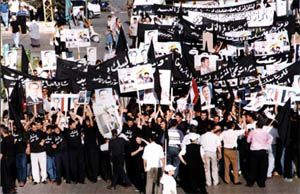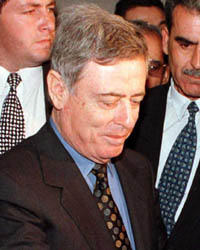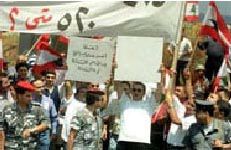 |
| Vol. 2 No. 6 | Table of Contents MEIB Main Page | 1 July 2000 |
 |
| Orchestrated displays of grief in Beirut |
In the days following the death of Syrian President Hafez Assad, virtually all major public institutions, from banks to universities, were closed for two days. The prime minister ordered television and radio stations to modify their programs to "what is suitable for this painful occasion" and seven foreign publications, including Time and Newsweek, were confiscated by government censors because they "sought to defame Assad and hurt the feelings of those upset by his death." One man who publicly called for celebration of the Syrian dictator's death was promptly arrested by security forces. A restaurant that dared serve falafel during the televised broadcast of Assad's funeral was ransacked by a mob.1
No, the scenes described above did not take place in Damascus, but in Beirut. In light of the rapid entrenchment of Syrian military, political, and economic control over the country in the last ten years, it is not surprising that the orchestrated displays of grief over Assad's passing which permeated throughout the Syrian capital should also manifest themselves in Lebanon. But beneath the superficial veneer of public mourning in Beirut is a palpable wave of exuberant anticipation and anxiety.
As a result of Syria's virtually complete control over Lebanon, major political transitions in Damascus tend to manifest themselves in Lebanon's political system. But what specifically does Assad's death portend for the Syrian occupation of Lebanon? The answer to this question is unclear. Two factors, however, must be taken into consideration when evaluating the future of the Syrian occupation. The first is that Bashar's control over Lebanon is limited by the continuing influence of Syria's "old guard" in Lebanese politics. The second is that opposition to the Syrian occupation has become much more intense and has spread to most sectors of Lebanese civil society.
Syria's Old Guard and the Syrian Occupation
 |
| Abdul Halim Khaddam |
While Bashar appears to have successfully eclipsed the power of the "old guard" in Damascus, at least for the time being, some of these figures still have significant influence in Lebanon. Many in the Syrian regime used their positions to amass enormous wealth over the years through drug smuggling, money laundering and other illicit activities in Lebanon and developed close ties with corrupt Lebanese politicians who profited themselves from the Syrian occupation.
In particular, though, Syrian Vice-president Abdul Halim Khaddam, former military chief-of-staff Hikmat Shihabi and (to a lesser extent) Defense Minister Mustafa Tlass have especially strong connections in Lebanon because they were the only high-profile Sunni Muslim figures in the regime and were instrumental in managing Syria's relations with Lebanon's Sunni Muslim establishment. Whereas Assad succeeded in marginalizing the traditional leaders (zu'ama) of the Shi'ite community during the Lebanese civil war (1975-1990) in favor of a new echelon of Syrian-supported militia elites, the Sunni political establishment remained largely intact (though it expanded to encompass the nouveaux riche). Khaddam, who controlled the "Lebanon file," and Shihabi both helped facilitate the acquiescence of these elites by putting a "Sunni face" on the occupation. The two were frequent guests at parties, weddings, and other social gatherings of Beirut's upper crust for many years.
Not surprisingly, when Bashar began emasculating potential opposition to his succession in 1998, he took over control of the "Lebanon file" from Khaddam and engineered the ouster of Shihabi. Both were key allies of Rafiq Hariri, the Lebanese prime minister at that time, and Druze MP Walid Jumblatt, the Lebanese Minister for the Displaced. Concerned that these two Syrian figures might one day use their ties to Hariri (and his wealth, estimated at $5 billion dollars) to contest his authority in the future, Bashar decided to remove the Lebanese prime minister from office. Hariri almost immediately began running into problems dealing with certain members of his cabinet, Parliament Speaker Nabih Berri, and other Syrian-installed figures within the regime and was eventually driven from office later that year after the election of President Emile Lahoud. Jumblatt lost his cabinet portfolio.
 |
| Rafiq Hariri |
Bashar cultivated very warm relations with Lahoud. The new president, mimicking Bashar's anti-corruption drive in Syria, proceeded to launch his own "war on corruption," which naturally targeted Hariri and several of his close political allies. The investigations against Hariri and Jumblatt on charges of embezzlement and mismanagement were primarily designed to destroy their reputations. Although former oil minister Shahe Barsoumian and a number of lesser-known officials from the Hariri administration were arrested and charged,.it is significant that neither Hariri nor Jumblatt were indicted.
As Bashar consolidated his authority within the Syrian regime through the appointment of loyal allies close to the Assad family in the military and security services, the same process occurred in Lebanon. General Michel Suleiman, whose Syrian brother-law was the official spokesman of Hafez Assad, was appointed commander of the Lebanese army, bypassing dozens of officers higher in rank and seniority. Other newly-appointed members of the Lebanese security establishment, such as Col. Jamil al-Sayyid, the head of General Security Directorate, also had long-standing associations with Assad.
Recent developments suggest, however, that Khaddam and Shihabi still have immense influence in Lebanon. One indication of this occurred last month, just days before Assad's death, when Syrian officials leaked to the press that Shihabi would soon be indicted on charges of embezzling millions of dollars from Syrian purchases of Soviet-built arms over the years.2 Shihabi happened to be in Lebanon at the time, staying at Hariri's residence while undergoing medical tests at a Beirut hospital. Surprisingly, rather than distancing himself from Shihabi, Hariri (along with Khaddam) personally traveled to Beirut International Airport to bid farewell to his friend, who boarded a flight (on Hariri's private jet, one source told MEIB) to Los Angeles and has not been heard from since.
Jumblatt, for his part, publicly condemned the campaign against Shihabi, noting that the former chief-of-staff had played a prominent role in the Assad regime and did not deserve such treatment. Official Syrian sources quoted in al-Hayat responded by condemning Jumblatt for "his attempt to portray symbols of corruption as nationalists," noting obliquely that "corruption is the same everywhere and the corrupt always close ranks."3
Why did Hariri and Jumblat so blatantly defy the Syrian regime? Perhaps because Bashar does not have full control over Syrian military and intelligence forces in Lebanon. It is noteworthy that Syrian intelligence forces in Lebanon under the control of Gen. Ghazi Kanaan did not make any attempt to obstruct Shihabi's departure. Although Kanaan and Khaddam have retained their positions in the Syrian regime for now and appear willing to acknowledge Bashar's authority as Syrian president, this does not mean that they will do his bidding in Lebanon. Hopes that the effects of Bashar's reformist drive in Syria will trickle down to Lebanon are probably misplaced.
Lebanon's Nationalist OppositionThe wave of newspaper editorials, demonstrations, and other public expressions of opposition to the Syrian occupation over the last few months, unprecedented in the last decade, shows no signs of relenting. These increasingly overt manifestations of public dissent were originally sparked by the atmosphere surrounding the failed Geneva summit between Assad and U.S. President Bill Clinton in March, which most Lebanese interpreted as a sign that American appeasement of Syria was waning. An open letter to Bashar Assad by Gibran Tueni, the editor of Lebanon's An-Nahar daily newspaper, on March 23 calling for Syria to withdraw set off an avalanche of like-minded editorials and public statements by journalists, community leaders, professional associations, and human rights groups throughout the country.4
In April, thousands of university students and other supporter of the Free National Current (FNC), a multiconfessional opposition group headed (from exile) by former Prime Minister Michel Aoun, staged demonstrations throughout the country for over a week. While the protests eventually subsided as a result of repeated detentions and brutal suppression by internal security forces, they revealed a renewed willingness by many Lebanese youths to openly confront Syria.5
 |
| Demonstrators at Nahr al-Kalb |
On June 25, an estimated 300 supporters of the FNC, waving flags and singing the national anthem, assembled at Nahr al-Kalb, where various inscriptions and plaques listing the foreign armies which have occupied the country over the last 3000 years have been erected.6 The demonstrators attempted to place two white marble tablets at the site--the first marking the Israeli withdrawal from Lebanon on May 24, 2000 and a second, left conspicuously blank, signifying the much-awaited withdrawal of Syrian forces--but were intercepted by internal security forces. The FNC later released a statement which condemned the intervention of security forces and defended the "natural right" of Lebanese "to celebrate the Israeli withdrawal and to conduct peaceful struggle to oust the Syrian occupying forces from the country."7
The withdrawal of Israeli forces from Lebanon in May has clearly strengthened the hand of nationalist groups in Lebanon. The argument frequently made by Syrian officials (and endlessly parroted by their protégés in the Lebanese government) that opposition to the Syrian occupation is synonymous with support for the Israeli occupation of south Lebanon now has an increasingly hollow ring. Attempts by Lebanese officials to bolster this argument by persuading the public that Israeli forces have not, in fact, completely withdrawn have made them the subject of ridicule and derision. Never before have representatives of the Syrian-installed regime so clearly revealed their lack of autonomy from Damascus as in the last several weeks.
A plausible scenario leading to the eventual withdrawal of Syrian forces from Lebanon may evolve from the combined impact of the two factors discussed thus far if (and this is a big if) Bashar's declared intentions to liberalize Syrian political life are for real. In order to to suppress elites in the political, military and intelligence apparatuses of the Syrian regime, he may find it necessary to cut off their ties to Lebanon and the massive amounts of revenue they derive from the country. This could, perhaps, lead him to open a dialogue with the Lebanese opposition. There have already been numerous rumors that Bashar has recently sent feelers out to Maronite Christian Patriarch Boutros Sfeir (none of which can be definitively substantiated), but only time will reveal how he will confront this challenge.
1 See "Deuil officiel de sept jours au Liban," L'Orient-Le Jour (Beirut), 11 June 2000; "Lebanon bans seven foreign publications over Assad," Reuters, 19 June 2000.
2 Al-Hayat (London), 6 June 2000.
3 Al-Hayat (London), 8 June 2000.
4 Open Letter to Bashar Assad, Al-Nahar (Beirut), 23 March 2000. Republished in The Middle East Intelligence Bulletin, April 2000.
5 See Lebanon's Intifada, The Middle East Intelligence Bulletin, April 2000.
6 The oldest are three inscriptions, dated around 1275 BC, from the reign of Egyptian Pharaoh Rameses II. Others include two commemorating the entrance of foreign troops under Esarhaddon I and Nebuchadnezzar II (6th and 7th centuries BC), Alexander the Great, the Mameluk Sultan Zahir Barquq (1390 AD), a French expeditionary force (1860), and British forces during World War I. Another notes the departure of French colonial forces in 1946.
7 The Daily Star (Beirut), 26 June 2000.